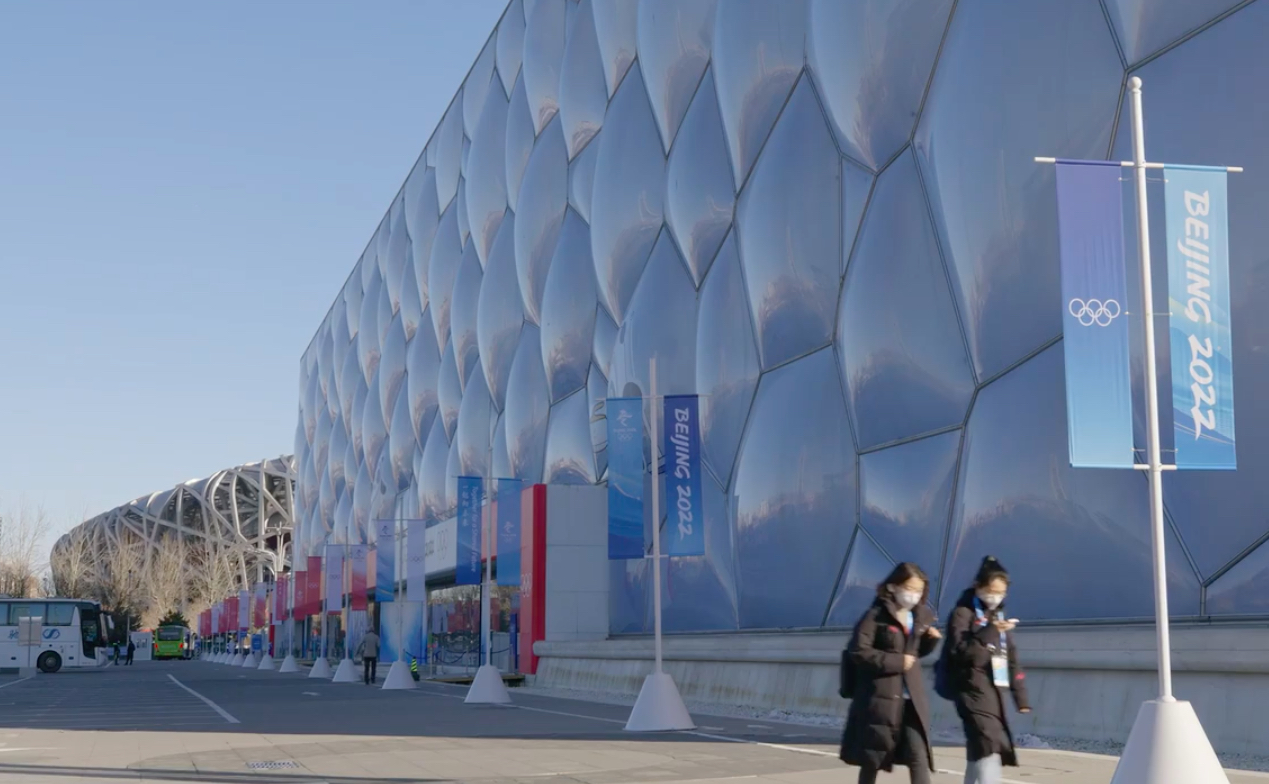NEWS
Alibaba to bolster digitalization for more efficient, sustainable, inclusive Olympic Winter Games

February 22, 2022 5:44 p.m.
IN an effort to bolster the International Olympic Committee’s digitalization efforts, Olympic Winter Games Beijing 2022 has successfully migrated its core games technology services to Alibaba Cloud, the digital technology and intelligence backbone of Alibaba Group. The migration has occurred against the backdrop of the Covid pandemic, in order to create a safer, more efficient, sustainable and inclusive experience for participants and audiences from around the world.
“The Olympic Winter Games Beijing 2022 will not just be remembered by the excitement and the phenomenal achievements brought by the athletes from across the world, but also for the new benchmarks it had set for driving a more efficient, sustainable and inclusive Olympic Games,” said Jeff Zhang, President, Alibaba Cloud Intelligence.
“We are proud to be supporting the digitalization of the Olympic Games, and we hope our experience in hosting Beijing 2022’s core operating systems on Alibaba Cloud will be passed on to future sporting events.”
Advanced cloud capability to boost organizer efficiency
The IOC and the Beijing Organizing Committee for the 2022 Olympic and Paralympic Winter Games executed a master plan for the Olympic Winter Games. It includes the implementation of key operational systems delivered by the IOC’s Worldwide IT Partner Atos, such as the Games Management Systems, Olympics Management Systems and Olympics Distribution Systems. These have all been migrated to Alibaba’s cloud infrastructure.
The Olympic Winter Games Beijing 2022 has realized a further move to cloud-based services, further reducing the time and cost investment on IT infrastructure, hardware and associated management. With the advanced cloud-based capability to analyze real-time intelligence, the planning and management for Beijing 2022 was further streamlined and improved for more seamless user experience.
Taking advantage of the scalability, reliability and security features of the cloud infrastructure, event organizers like the IOC can reduce the complexity of the game planning based on intelligence-driven decisions; striking for the right balance between optimizing existing resources and creating new ones.
That way hosting cities can also reduce the time and costs associated with the legacy physical infrastructure investment upfront.
Cloud technology helps bring the world closer together
Beijing 2022 also showcased a series of technological innovations developed to bring more inclusive experiences for fans in multiple locations. Alibaba introduced Cloud ME, a cloud-powered realistic projection that facilitates remote social interactions. The technology defies distances by enabling people to meet and converse with each other’s life-sized, true-to-life persona projections.
In addition, Alibaba unveiled Dong Dong, a 22-year-old virtual influencer. Originating from Beijing, Dong Dong was created to interact with fans globally, sharing fun and informative Olympic-related facts.
Speaking in a natural-sounding human voice, she can convey a range of emotions. This has proven to be particularly efficient for engaging with the younger audience.
From February 4 to 20, Dong Dong’s livestreaming has been viewed by more than 2 million viewers with a fan base of more than 100,000.
To deliver the best Olympics content to a global audience, Alibaba’s cloud computing technology also powers the Olympic Channel Services, which brings high quality programs to fans around the world to engage with the Olympic Movement anytime, anywhere, and on any device.
Sustainable innovations for the future of Olympics
For the first time the distribution of live signals of the Olympic Games over the cloud has been implemented, providing Rights Holding Broadcasters with agile and cost-effective options. Through the Olympic Winter Games, 6,000 hours of footage were produced by the OBS and broadcasted to more than 220 countries and territories.
The OBS Video Server, which was fully hosted in the cloud, provides RHBs with efficient and scalable system while reducing onsite hardware investment. With Content+, RHBs could access all content produced during the Olympic Winter Games, including the live coverages, remotely with ease.
The implementation of OBS Live Cloud also provides an alternative to heavy investment for RHBs and the host cities, when the Olympic Games related contents can be transmitted over the public cloud, effectively reducing the carbon footprint of broadcasting related operations.
In addition, OBS also leveraged multi-camera replay videos with Alibaba, providing replays of competition highlights for curling and speed skating within seconds, bringing engaging and dynamic viewing experiences to audience around the world via RHBs on the cloud.
Ilario Corna, Chief Information Technology Officer, IOC said, “Beijing 2022 should champion innovation as well as sporting success. I am thrilled to see that the cloud-based technology in action at the Olympic Winter Games not only benefits athletes, fans and operating staff, but also helps us to honor our ambition to ensure the Olympic Games are at the forefront of sustainability.”
NEWS
TikTok enhances safety, transparency for Filipino community with new initiatives

7:01 p.m. July 16, 2023
TikTok, the world’s leading short-form video platform, is taking further steps to ensure a safer and more transparent platform for its Filipino community. In response to the evolving digital landscape and the rise of AI-generated content (AIGC), these initiatives are designed to maintain a secure environment, uphold community guidelines, and ensure users can trust the content they encounter on the platform.
Strengthening Community Guidelines Enforcement
As part of its ongoing efforts to safeguard its community, TikTok recently published its Q1 2024 Community Guidelines Enforcement Report. During this period from January 1 to March 31, 2024, TikTok removed 4.26 million videos in the Philippines for violations of its Community Guidelines. Of these, 99.7% were removed proactively, and 95% were taken down within 24 hours.
To further enhance transparency, TikTok updated its Community Guidelines in April to provide clearer rules and introduce new features that help creators understand and comply with policies. Available in English and Filipino, these guidelines include detailed definitions and outline moderation practices for features like Search, LIVE, and the For You feed, ensuring policies are clear and accessible to all users.
Advancing AI-Generated Content Transparency
In response to the increasing prevalence of AI-generated content, TikTok has implemented new measures for transparency. Since May, TikTok has automatically labeled AI-generated content uploaded from specific platforms. This initiative is part of a collaboration with MediaWise, a program of the Poynter Institute, and the Coalition for Content Provenance and Authenticity (C2PA), making TikTok the first video-sharing platform to adopt C2PA’s Content Credentials technology. These labels aim to provide users with clear context about the nature of the content they consume.
Educating the Community with Media Literacy Tools
To support its community in navigating AI-generated content and combating misinformation, TikTok is launching new media literacy resources. Developed in collaboration with experts, these resources are integral to TikTok’s broader strategy to enhance user understanding and foster a more informed community. As part of this initiative, TikTok has partnered with MediaWise to release 12 educational videos throughout the year. These videos aim to teach universal media literacy skills and explain how TikTok’s AI-generated content labels can help contextualize content. This partnership underscores TikTok’s commitment to educating its community and fostering a more informed user base.
Expanding AIGC Labeling Through Partnerships
Building on its efforts to ensure content transparency, TikTok has extended its auto-labeling capabilities for AI-generated content created on other platforms. By integrating the ability to read Content Credentials from C2PA, TikTok automatically recognizes and labels AI-generated content, with plans to expand this to audio-only content soon.
In the coming months, TikTok plans to attach Content Credentials to its content, ensuring transparency even when content is downloaded, allowing users to utilize C2PA’s Verify tool to identify AI-generated content and understand its creation details.
Driving Industry-Wide Adoption
In its mission to promote industry-wide adoption of Content Credentials, TikTok has joined the Adobe-led Content Authenticity Initiative (CAI). As the first video-sharing platform to implement Content Credentials, TikTok is at the forefront of encouraging transparent content practices across the industry. The gradual increase in auto-labeled AI-generated content on TikTok is expected to grow as more platforms adopt this technology, fostering a more transparent digital landscape.
For You Feed and Creator Code of Conduct
To further enhance safety, TikTok has introduced new standards that will temporarily restrict accounts that repeatedly violate content standards. These accounts and their content will be harder to find in search, with creators being notified and given the option to appeal.
Additionally, TikTok published a Creator Code of Conduct outlining the standards expected from creators involved in TikTok programs, features, events, and campaigns. This code reinforces TikTok’s commitment to maintaining a safe and inclusive platform.
Through these measures, TikTok continues to focus on helping its community, especially creators, understand its rules and enforcement methods to ensure a safer experience for its users. By embracing continuous innovation and collaboration, TikTok strives to create a secure and inclusive space for creativity and connection.
NEWS
SM Prime, DTI empower MSMEs with 83 SM mall spaces, training, mentorship


9:15 p.m. July 12, 2024
Good news for Micro-, Small, and Medium-Sized Enterprises (MSMEs)! SM Prime Holdings (SM Prime) and the Department of Trade and Industry (DTI) solidified a partnership through a Memorandum of Agreement (MOA) signing ceremony held on July 1 at the SM Prime Headquarters.
This collaboration empowers MSMEs with prime mall space in 83 SM Malls nationwide, aligning with the One Town, One Product (OTOP) Philippines program. Besides providing space, SM Prime offers MSMEs discounted booth rentals, training programs on product development, marketing, financial management, and mentorship opportunities with experienced business leaders.



NEWS
DTI National Food Fair celebrates local flavors at SM Megamall

8:26 p.m. July 11, 2024
The Department of Trade and Industry (DTI) successfully concluded the 10th National Food Fair at SM Megamall’s Megatrade Halls 1-3, held from July 3-7, 2024. This premier event showcased the rich flavors of the Philippines and empowered over 200 Micro-, Small, and Medium-Sized Enterprises (MSMEs).
Food enthusiasts enjoyed a bounty of fresh produce, regional specialties, and delectable treats from all corners of the country. Attendees had the opportunity to stock up on pantry staples, explore health-conscious options, and discover unique ingredients to elevate their cooking skills.
(L-R): Megatrade Hall’s Maite Quiogue, SM Supermalls’ Assistant Vice President for Operations Royston Cabunag, Department of Trade and Industry (DTI) Undersecretary for Micro-, Small, and Medium-Sized Enterprises (MSME) Development Group Cristina Roque, Guest of Honor Winnie Chua-Go, SM Megamall Assistant Vice President for Operations Christian Mathay, SM Supermalls’ Vice President for Corporate Marketing Grace Magno, DTI-Bureau of Market Development, Promotions, and One Town, One Product (OTOP) Philippines Director Marievic Bonoan, and SM Megamall Assistant Mall Manager Isabella Manjon
(L-R): Department of Trade and Industry (DTI) Undersecretary for Micro-, Small, and Medium-Sized Enterprises (MSME) Development Group Cristina Roque, Guest of Honor Winnie Chua-Go, and DTI-Bureau of Market Development, Promotions, and One Town, One Product (OTOP) Philippines Director Marievic Bonoan
The 2024 Department of Trade and Industry (DTI) Bagong Pilipinas National Food Fair brings together the best food and flavors from all 16 regions.
Fresh pomelos and other local fruits take center stage at the National Food Fair in Megatrade Hall.
A potential buyer gets ready to take home bottled Bicol Express and Laing at the 10th National Food Fair in SM Megamall.
Crispy, salty, and packed with nutrients —these water spinach chips are the perfect healthy snack.
Bottled honey and baked fruit crisps, all made with local ingredients.
Davao del Sur and Misamis Oriental’s chocolate products are crafted from premium cacao beans.
Quality golden salted eggs from Rizal.
A variety of coconut products from San Pablo, Laguna.

















